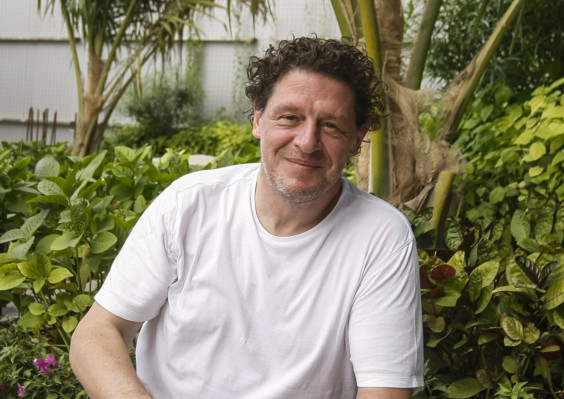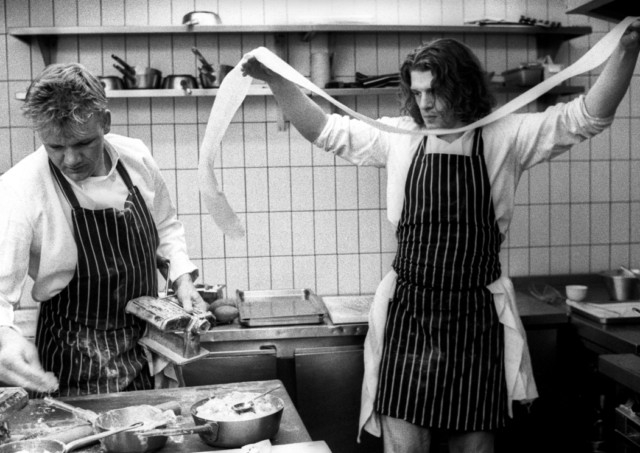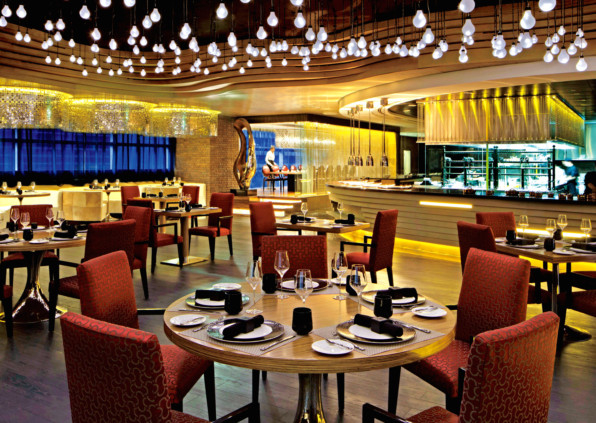
His hair is slightly shorter, but still tousled and chaotic. The stubble is slightly greyer than is depicted in the myriad media images of his best l’enfant terrible pose. But the black-and-white checked vans are still donned, the Malborough Reds are still being smoked voraciously and the demeanour is disarming, personable and engaging.
Underneath the lithely ageing and reflective countenance, Marco Pierre White is still the 60s rocker bohemian with a lot to say about the industry that made him a household name.
The rocker analogy is quite apt. England’s leather-clad bad boys of the 60s, who defined themselves in opposition to the Mods, had a formative impact on White’s outlook on life and gastronomy, which was coloured as much by his working-class roots in Leeds on a council estate as it was by a feeling of alienation, later diffused by an identity forged behind the stove.
“Metaphorically speaking, when every boy was young, he had to make a decision. Is he going to be a rocker or a mod? I chose to be a rocker. That was my make-up,” he says.
White, now 51, talking to GN Focus at the opening of the new Marco Pierre White Grill at the Conrad Dubai, recalled his first experience of a rocker as a “defining moment” in his life.
“What I loved about rockers was that they took their bikes apart, got greasy fingers and got dirty. And then they put it back together. They made things. The mods were the fluff,” he says.
The image of White as a leather-clad biker rebelling against the system is not difficult to picture. But the similarity between him and those who got their hands dirty is one that filters into his outlook on gastronomy.
Talentless celebrity
White’s 1990 book White Heat led to the birth of the first rock star celebrity chef, though celebrity status is not something that he endorses or longs for.
“You don’t have to be talented to be a celebrity. Chefs are tradesmen,” he says. “If you look at photographs of me as a young man, I look tired. You can see the burns on my arms, the cuts on my hands. When you see photographs of chefs today, they don’t look tired, do they? They look like they’ve been to the gym.
“I’m not trying to be controversial; it’s just a different breed, a different generation.
“I come from the old world of gastronomy, Auguste Escoffier’s world — when chefs were behind stoves, and not in front of cameras,” he says, lamenting the prevalent celebrity chef culture of today that sees chefs cover as many tabloid column inches as world leaders.
Taking the 19th century revolutionary French restaurateur as the paragon that chefs should aspire to become, White, who became the youngest chef to win three Michelin stars at 33, says that a return to simple food in an atmospheric setting at a good price is what diners want from eating out today, rather than the expense and unease of pretentious Michelin-starred restaurants.
“They have their place, but I find a lot of [Michelin-starred restaurants] one dimensional. They’re so boring, it’s like sitting in the Chapel of Rest. And they give you these little knick-knack dishes and I want to be fed. I can’t enjoy one little mouthful of lukewarm food, to be quite honest,” says White.
Instead, his preference, which he says is most people’s first choice when eating out, is a comfortable environment with friendly service and real food. Whether it’s a steak or a cassoulet, he doesn’t fuss. “I like simplicity, I like normal,” he says.
The Marco Pierre White Grill at Conrad Dubai will be a simple steakhouse that services the needs of the guests in the hotel, White says. Though having retired from the kitchen at 38, he will not comment on how often he will return to the restaurant that bears his name.
Out of date
Asked if he misses the maelstrom of kitchen life, White answers with an emphatic “No”.
His tenure in the kitchen began by being trained by the likes of Raymond Blanc and Pierre Koffmann. And he has trained the all-swearing television omnipotent Gordon Ramsay, among other famed chefs. To date, White is reputedly the only man to have made the Scottish chef cry in the kitchen.
He continues frankly, “I’m out of date and I like that. I like the fact that I’ve got nothing to prove. I’m not insecure in my world. I don’t need to be on television, and I don’t need to be admired.”
Asked why he appeared on ITV’s Hell’s Kitchen in 2007, having turned down the opportunity twice before, he says, “I wanted to show that professional cooking is not about being a star or a celebrity. It’s about doing your job. It’s about feeding everyone to the best of your abilities with the kitchen you’ve been given. It’s as simple as that.”
While being prey to much mixed publicity since he rose to fame, which he acknowledges is part of tabloid celebrity culture, White has always focused on his food as the primary symbol of his being. It allowed him to find and express himself in a way he couldn’t in language.
“Gastronomy without question is the greatest form of therapy any misfit could experience. I was one of those misfits and the kitchen was the perfect place for me to hide.
“I didn’t have the confidence to speak or express myself verbally, so I expressed myself through the food I made.
“Cooking is a philosophy, not just recipes. Food is not an art form. The artist is Mother Nature. Great chefs accept that Mother Nature is the true artist and they are the cooks.
“Everything they do becomes and extension of them as a person and through their food they give you great insight into the world they were born into,” he says.









